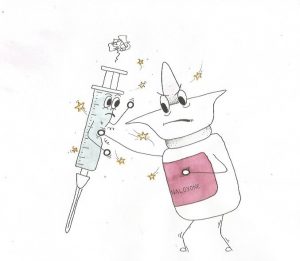Tulane can help Louisiana combat its urgent opioid crisis
September 25, 2019

At Tulane, an exciting effort is currently underway to find safe alternatives to fatal opioids that have haunted countless Americans. Despite positive news at Tulane and nationally, the opioid crisis is worsening in Louisiana and demands immediate solutions from political and medical leaders.
Joseph Kanter, the medical director of the Louisiana Department of Health, said in an interview with Fox 8 Live, “In Louisiana, we’ve not seen a decrease yet. Our 2018 overdose totals are still increasing. That’s a message to all of us that we have to continue to be vigilant, and continue to invest resources towards this.”
A study by Tulane professor James Zadina and graduate student Amy Feehan tested the effects of a novel opioid, ZH853, in hopes it can work to combat addiction to harmful opioids.
The study, performed on rats after surgery, showed that ZH853 was significantly more effective in preventing pain and promoting recovery than dangerous drugs like morphine. With human clinical trials of ZH853 set to begin within two years, there is hope that additional solutions are on the horizon.
Louisiana’s elected officials have recently taken steps to fight the unacceptable status quo, as Governor John Bel Edwards has worked with the state legislature to pass bills which expand access to Medication-Assisted Treatment and ensure Louisiana’s Medicaid program covers Methadone, a widely used drug that effectively treats opioid use disorder.
A Tulane University professor’s 20-year quest to develop a nonaddictive opioid painkiller has cleared another major hurdle in its early phases of laboratory testing.https://t.co/ObHzil8iyS
— New Orleans Advocate (@theadvocateno) June 2, 2019
The shocking reality, however, is that Louisiana does not currently have enough state facilities to treat Opioid Use Disorder victims. A recent law mandates state treatment facilities provide at least two forms of MAT by 2021, but Louisiana has not even opened a new opioid treatment program in more than a decade.
Much of the inaction can be attributed to Louisiana’s conservative lean. There is an inherent distrust of the government interfering in individual lives, and many citizens would prefer to make their own decisions. As a result, Louisiana’s relatively small state government has had difficulty launching programs to help combat a problem as large as the opioid crisis.
With the rapid development of ZH853 at Tulane University School of Medicine, perhaps Louisiana could utilize ZH853 as an additional MAT option. Given the state’s glaring failure to even open new facilities, however, it is difficult to envision Louisiana suddenly reforming and providing multiple forms of MAT in high quality facilities within two short years.
Today, LDH released Louisiana’s Opioid Response Plan, the first of its kind for the state. The plan aims to successfully reduce Louisiana’s opioid epidemic by addressing under-reporting of opioid deaths, enhancing monitoring and increasing access to treatment. #LDHImprovingHealth
— LA Dept of Health (@LADeptHealth) September 24, 2019
Louisiana’s junior senator, John Kennedy, recently announced the state was receiving $11.7 million in federal funding for the opioid crisis, adding to the nearly $50 million of federal funding that Louisiana has received.
While any additional support the federal government can provide is certainly welcome, it is clear that the federal government has failed to respond to Louisiana’s inability to resolve this epidemic. If federal and state leaders are serious about eradicating the opioid epidemic in Louisiana, then they must prove their commitment by providing more financial assistance.
There is a clear difference between the state meddling in our lives and the state simply providing necessary resources to prevent an epidemic from tarnishing Louisiana’s citizens, economy and way of life forever.
The lives of all Louisianians are on the line. Louisiana must have an all-hands-on-deck approach involving federal, state and Tulane leaders to resolve this crisis.





















Leave a Comment